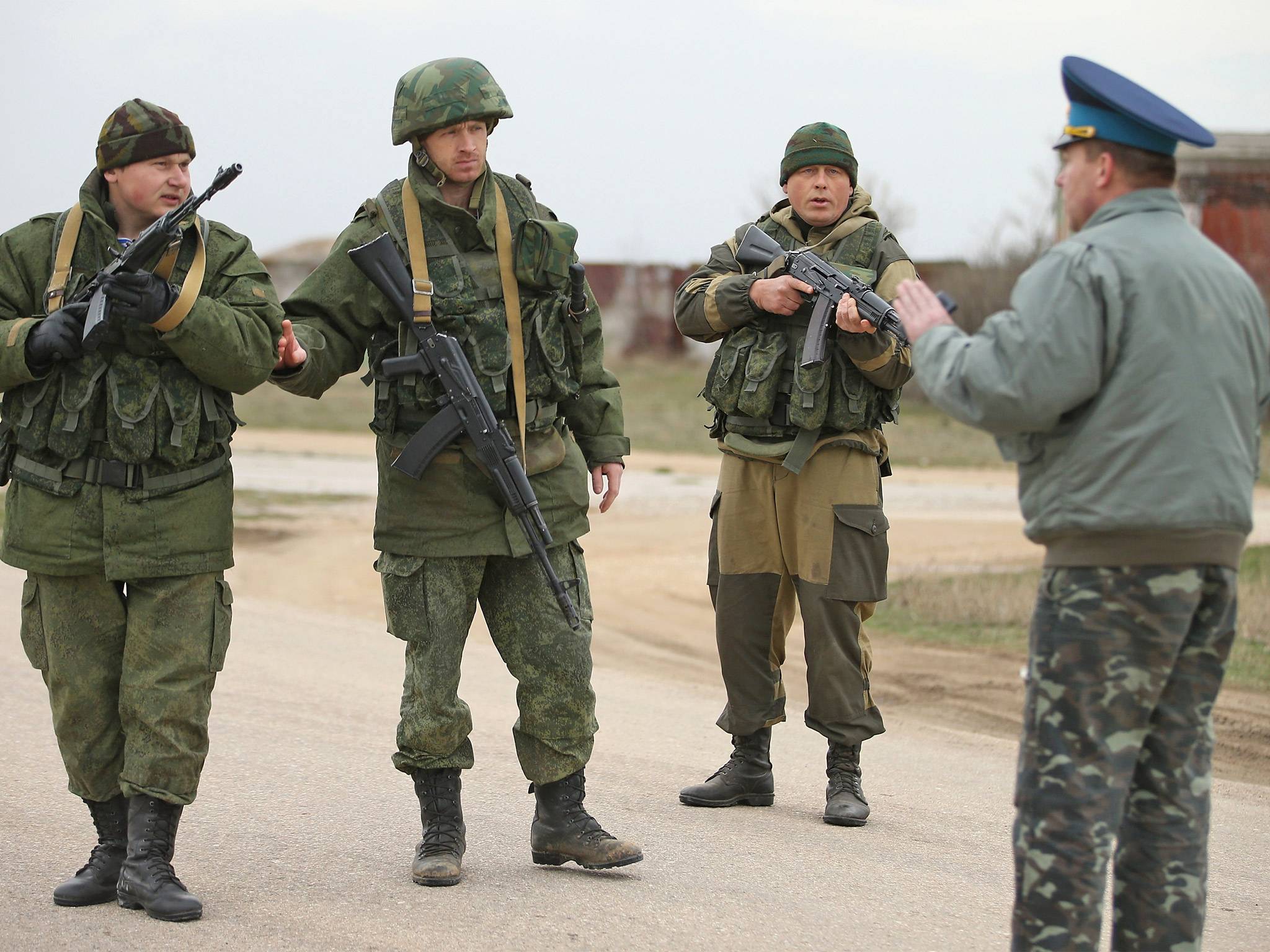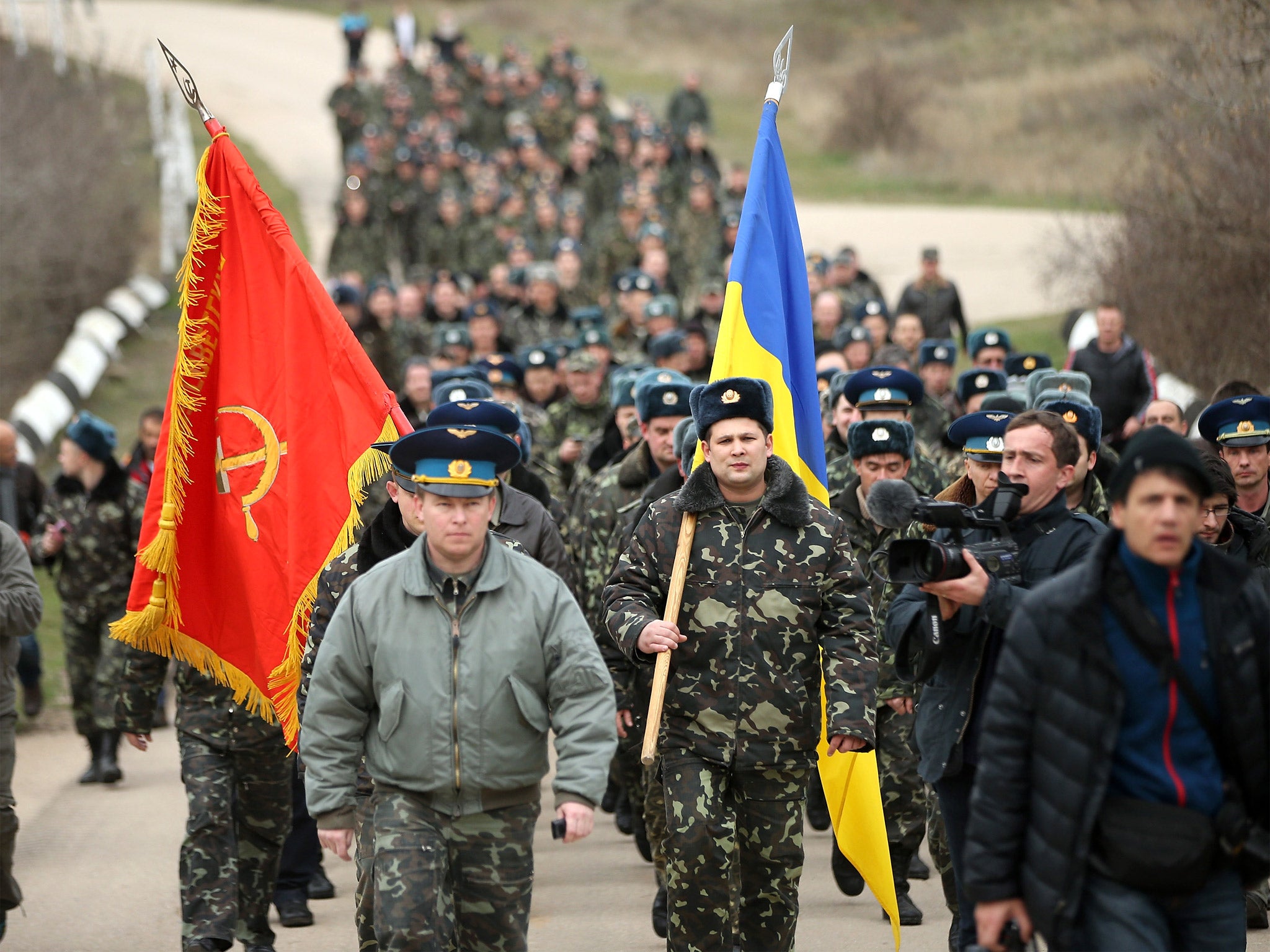Ukraine crisis: Gunfire, paranoia and football on the Crimea base that plays host to two armies

At just after 8.02 in the morning Colonel Yuli Mamchuk led his men up the hill of their airbase in Belbek. They sang the national anthem as they marched behind their regimental colours and the flag of Ukraine fluttering in the rainy wind. Twenty one minutes later, their path was blocked by Russian troops in balaclavas, who shouted at them to turn back and then opened fire over their heads.
The soldiers of Ukraine, unarmed, paused for a fleeting moment, but then resumed stepping forward, in unison, at the same pace, continuing to sing. At this point, a Russian screamed “Stop, or we will shoot you on the legs”, one of their officers stepped forward with his palm raised. Colonel Mamchuk called his soldiers to halt and stepped forward to negotiate.
What has been going on at this military airport near Sevastopol has been a mark of bravery and defiance against huge odds. Col Mamchuk and his regiment, not hardened combatants but providers of technical support to aviation, have dared to say 'no' to the military might of Russia. Day after day, they had stood up against intimidation, refusing to abandon their posts, with no help from the new government in Kiev. Their example has been followed across the state; other bases have refused demands to surrender, remaining awkward thorns as the Kremlin closes its fist over Crimea.
These are not entirely symbolic gestures; most of the bases are of significant strategic value and thus of interest to the Russians. Belbek, for example, can be used to monitor the air corridor into Sevastopol, where the Russian navy's Black Sea Fleet is based. Mi-24 helicopter-gunships and Czech made L-39 helicopter-gunships dotted around the airfield are in states of disrepair, but modern Mig-29 Fulcrum fighters lie underneath reinforced hangars.
What made the march of the Ukrainian soldiers to demand back the area of the base the Russians had taken over all the more remarkable was that for the previous 24 hours they had been living under repeated threats of attack from the Russians, and have had little sleep the previous night.
The Independent was at Belbek during the day when an ultimatum to surrender, delivered by Lieutenant Colonel Vladimir Mirnov of the Black Sea Fleet, came and went. It was an extraordinary scene, inexperienced young soldiers, without body armour or helmets, waiting for an assault by marines, infantry and special forces, Spetznatz.

Outside the main gate stood their families and neighbours in solidarity, declaring they would not leave at this time of peril. Two Tigers, Russian version of Humvees, had driven up, but turned around again after seeing the civilians gathered.
The cold Crimean night which followed was spent beside a fire built on the road. People were anxious about what lay ahead, texts have been sent to the telephone numbers of soldiers' families, promising retribution if the base was not vacated. There was also singing and prayers, many from the garrison coming out to join in. As three o'clock approached, they returned to the base; an attack was expected around this time. “I was very scared, I have never been in a war and I was not sure I was going to survive” confessed 20 year old Viktor Nikolovitch, in the army for just over a year. He had been crouching with his Kalashnikov behind sandbags which had kept collapsing.
However, the time of danger passed. Just after dawn, the regiment lined up for parade to hear Col Mamchuk say: “Last night our wives and children were at the gate protecting us. We did not join the army to be protected by our families, by civilians. We should be the ones protecting them. This morning we will march up there and show them that we are soldiers. We shall not respond to their provocation, but we shall claim back the parts of this base which has been occupied by a foreign power.”
The initial talks which had begun after the shots had been fired appeared to go well. Ten Ukrainians were allowed to go into the arsenal, the hangars and the control towers. Negotiations continued on the windblown hillside; the Russians stationed snipers, drove up an armoured personnel carrier, and put in perimeter defences. The Ukrainians decided to have a game of football.
“Well, we were in no position to fight them; we didn't want to leave either and the football field was one of the few things in that sector they had not taken over,” observed Corporal Anton Kurlilenko. “Also, it has been a really difficult, tense few days, people were very worried, so it was a good way to be relaxed. We thought of asking the Russians to join in, but they did not look relaxed at all. So we just stayed on and hoped the talks would go well so that we can return to the jobs we had.”
The talks, however, were not going well. Col Mamchuk was not able to meet any senior Russian officers. He was reduced, instead, to negotiating with a leader of the 'self-defence volunteers' who had been formed among those of Russian extraction, a man named Yuri Baiduk, who turned up unshaven, in dirty jeans and trainers.
If this was an attempt to snub and belittle, the Colonel refused to rise to the bait. Under his slightly oversized hat, which did not fit the stereotypical mould of a resistance hero, the refusal to back down was spreading the commander's fame. “We will try to make progress, we have got some people in now, we hope to get more in. They keep asking us to surrender our weapons, but we'll never do that”, he insisted.
A call came to Col Mamchuk's mobile, it was one of the senior officials at the Ministry of Defence in Kiev. What were the instructions? “They just keep asking me to use my own initiative, that has been the case ever since the Russians arrived here. We have been given no guidance, what we can agree to or not. So we are really on our own here.”
Mr Baiduk, the leader of the 'volunteers', called the Colonel away. He returned to say: “The man said I should not talk to the media. But I pointed out to him that we are still in free Ukraine and we believe in free speech here, I don't think he understood what that involved”, he said. “I am still hoping to speak to a senior Russian officer rather than these people.”
The 'volunteers' had formed a line in front of the Russians. They are increasingly in evidence across the state; it is difficult to ascertain whether they were all playing at being tough guys or some were actually serious players. Grigori, a burly young man who had kept his face hidden by the top of his roll-neck jumper made dark allusions to “manipulation” by foreign powers, and spoke of hunting in the woods for saboteurs. His vision of the future was a bleak one of continuing confrontation: “There is no going back.”
Col Mamchuk, meanwhile, was set for more talks in the evening, probably followed by another ultimatum from the Russians. How long can this continue? “Only God knows that, we just have to carry on and not give up,” he said with a tired shrug, but his voice had remained firm.
Join our commenting forum
Join thought-provoking conversations, follow other Independent readers and see their replies
Comments
Bookmark popover
Removed from bookmarks